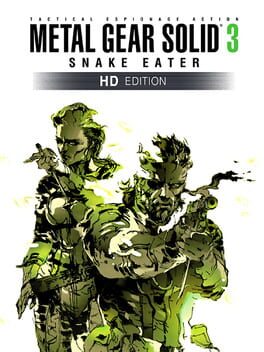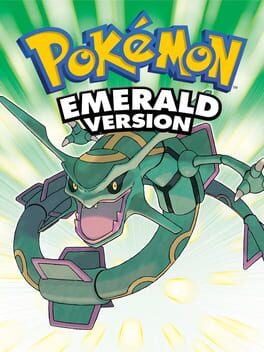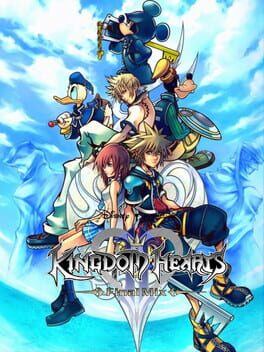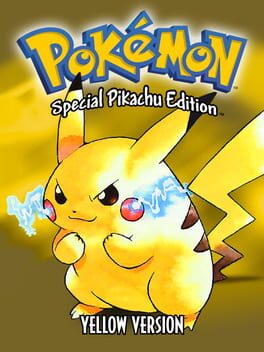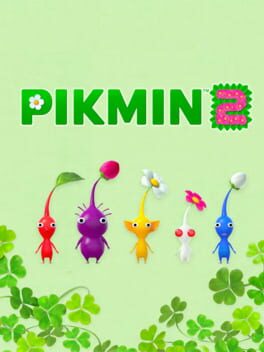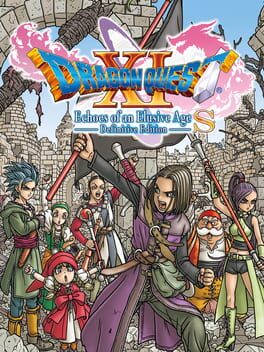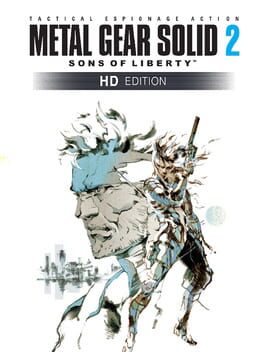oldfriendfox
24 reviews liked by oldfriendfox
This review contains spoilers
[This review also contains minor spoilers for the end of The Legend of Zelda: The Wind Waker]
"It's almost time for me to go.
And with me... The last embers of this fruitless war dies out. And at last those old evils will be gone.
Once the source of evil returns to zero... A new one... A new future... Will be born.
That new world... Is yours to live in. Not as a snake... But as a man."
How does a hero die? By the hands of their enemies? Their friends? The people who believed in their legacy? Or is it by their own will to carry out a mission that no one is asking them to do?
Metal Gear Solid 4 is a game that resents its own existence. A brutal reflection on the series it's meant to send off while also criticizing it's role in perpetuating a cruel, violent digital world by an artist that is reluctantly taking on the job because he believes it's his battle alone. Old Snake is very clearly a stand-in for Kojima: a man hellbent on killing himself over a mission that could be taken on by someone else, but that'd only divert harm to them rather than make things easier for everyone (see Raiden's arc in this game). Instead it feels more appropriate for him to finish the job himself, accepting the responsibility of his actions/legacy, and then die a soldier.
Except he doesn't die a soldier, instead his father--a man whom Snake had been shaped into emulating from his inception--visits him from the beyond the grave to send a message. A plea to keep going and see his life to its natural conclusion. The old world is over and its champions have expired, there's no point in fighting anymore. It's time instead to finally rest.
When reading the opening quote, a section from Big Boss's parting words to Snake, I think about a similar speech from King Hyrule in the final moments of The Wind Waker:
"My children... Listen to me.
I have lived regretting the past.
And I have faced those regrets.
If only I could do things over again... Not a day of my life has gone by without my thoughts turning to my kingdom of old.
I have lived bound to Hyrule.
In that sense, I was the same as Ganondorf.
But you...
I want you to live for the future.
There may be nothing left for you...
But despite that, you must look forward and walk a path of hope, trusting that it will sustain you when darkness comes."
While Wind Waker is contextualized from the perspective of the youth who'll be living in this liberated world as opposed to the decaying old guard in Guns of the Patriots, they're both communicating the same idea. It's time to let go of the glories of the past so that the new generation can finally live for themselves. And where Zelda took that idea as permission to constantly evolve itself andalmost never look back, Metal Gear Solid (or more specifically, Kojima) saw it as a means to permanently end the series.
There were more Metal Gear games to come in the future, of course; but this was the end of it as a legend, as a complete narrative. This is where Solid Snake died.
"It's almost time for me to go.
And with me... The last embers of this fruitless war dies out. And at last those old evils will be gone.
Once the source of evil returns to zero... A new one... A new future... Will be born.
That new world... Is yours to live in. Not as a snake... But as a man."
How does a hero die? By the hands of their enemies? Their friends? The people who believed in their legacy? Or is it by their own will to carry out a mission that no one is asking them to do?
Metal Gear Solid 4 is a game that resents its own existence. A brutal reflection on the series it's meant to send off while also criticizing it's role in perpetuating a cruel, violent digital world by an artist that is reluctantly taking on the job because he believes it's his battle alone. Old Snake is very clearly a stand-in for Kojima: a man hellbent on killing himself over a mission that could be taken on by someone else, but that'd only divert harm to them rather than make things easier for everyone (see Raiden's arc in this game). Instead it feels more appropriate for him to finish the job himself, accepting the responsibility of his actions/legacy, and then die a soldier.
Except he doesn't die a soldier, instead his father--a man whom Snake had been shaped into emulating from his inception--visits him from the beyond the grave to send a message. A plea to keep going and see his life to its natural conclusion. The old world is over and its champions have expired, there's no point in fighting anymore. It's time instead to finally rest.
When reading the opening quote, a section from Big Boss's parting words to Snake, I think about a similar speech from King Hyrule in the final moments of The Wind Waker:
"My children... Listen to me.
I have lived regretting the past.
And I have faced those regrets.
If only I could do things over again... Not a day of my life has gone by without my thoughts turning to my kingdom of old.
I have lived bound to Hyrule.
In that sense, I was the same as Ganondorf.
But you...
I want you to live for the future.
There may be nothing left for you...
But despite that, you must look forward and walk a path of hope, trusting that it will sustain you when darkness comes."
While Wind Waker is contextualized from the perspective of the youth who'll be living in this liberated world as opposed to the decaying old guard in Guns of the Patriots, they're both communicating the same idea. It's time to let go of the glories of the past so that the new generation can finally live for themselves. And where Zelda took that idea as permission to constantly evolve itself and
There were more Metal Gear games to come in the future, of course; but this was the end of it as a legend, as a complete narrative. This is where Solid Snake died.
Hate to sound like a "I was born in the wrong generation" type but I would kill for the opportunity to go back to 2004 and experience, along with the whole world, just what video games were truly capable of. And it speaks to this game's quality that you can feel the weight of it's legacy within every moment. Similar to Super Mario Bros., Ocarina of Time, or Doom in that the entire medium would be unquestionably different had it not been made, but unique to those games is this game's sense of artistic completion. There's not one second that seems compromised, restricted, or just a couple steps away from it's true potential. Instead, it just feels whole.
There's nothing like Snake Eater, and perhaps there'll never be anything like Snake Eater (especially not the newly announced remake). But that's fine, because even now, 20 years after the game's release on the PS2, this shit is still life-changing.
There's nothing like Snake Eater, and perhaps there'll never be anything like Snake Eater (especially not the newly announced remake). But that's fine, because even now, 20 years after the game's release on the PS2, this shit is still life-changing.
It’s Summer 2005. I’m on my way to my grandparent’s place in Buffalo, New York. I’m crammed in the car with the rest of my family as we barrel through our 5 hour long drive. At this point I’m either yapping away about random nonsense or playing Yoshi’s Island on my silver GBA SP. But quickly something else catches my attention: trumpets. I look over to my brother and see him playing this game. I watch him run through Hoenn and experience a grand adventure as those iconic 32-bit horns sang endlessly. It was intoxicating.
At that moment and many times afterward I’d beg for him to let me try it, but he was territorial with Emerald. “No. This is my game. You’re not allowed.” This was common with many of the games we had growing up—Wind Waker, Sonic Adventure 2, etc.—but with those he’d eventually grow out of love and I’d take over the reigns after a short time. Pokémon was always different, however. Even though I’d eventually get my own game with Pearl a few years later, I had always felt more like an onlooker with the series more than anything else. I’d keep up with what they were doing from time to time, replay my own games, maybe dabble in the the newer titles; but subconsciously I always saw it as my brother’s game. It was special to him, and still is to this day.
It’s funny, though; no matter how much I’d distance myself from the series I still wanted more out of it. I wanted the connection that my brother (and so many others) had with this titan of gaming. In that sense you could say I was jealous of how engrossed he was, and even bitter that he restricted my access from such a young age. Sure I could’ve asked my mom for my own copy, or even played it behind my brother’s back; but again to some extent I felt like it didn’t belong to me. I was a passenger to the Pokémon, not a driver. And even now, after spending nearly 50 hours having my own adventure in Hoenn (and almost definitely spending more hours catching the remaining legendaries); I still feel like an outsider of sorts.
However, I’d absolutely be lying if I said that finally defeating the Elite Four after all these years of hearing their theme out of the corner of my ear many times as a small child wasn’t cathartic as hell. There’s something about the traditional Pokémon structure that just makes it all worthwhile in the end. Through all the bullshit, through all the grinding, through all the gnawing little grievances that would make me put down the game and nearly swear it off after playing for hours on end, there’s rarely a better feeling than seeing your team—that you personally raised from the early areas—inducted into the Hall of Fame. Again, it’s just intoxicating.
At that moment and many times afterward I’d beg for him to let me try it, but he was territorial with Emerald. “No. This is my game. You’re not allowed.” This was common with many of the games we had growing up—Wind Waker, Sonic Adventure 2, etc.—but with those he’d eventually grow out of love and I’d take over the reigns after a short time. Pokémon was always different, however. Even though I’d eventually get my own game with Pearl a few years later, I had always felt more like an onlooker with the series more than anything else. I’d keep up with what they were doing from time to time, replay my own games, maybe dabble in the the newer titles; but subconsciously I always saw it as my brother’s game. It was special to him, and still is to this day.
It’s funny, though; no matter how much I’d distance myself from the series I still wanted more out of it. I wanted the connection that my brother (and so many others) had with this titan of gaming. In that sense you could say I was jealous of how engrossed he was, and even bitter that he restricted my access from such a young age. Sure I could’ve asked my mom for my own copy, or even played it behind my brother’s back; but again to some extent I felt like it didn’t belong to me. I was a passenger to the Pokémon, not a driver. And even now, after spending nearly 50 hours having my own adventure in Hoenn (and almost definitely spending more hours catching the remaining legendaries); I still feel like an outsider of sorts.
However, I’d absolutely be lying if I said that finally defeating the Elite Four after all these years of hearing their theme out of the corner of my ear many times as a small child wasn’t cathartic as hell. There’s something about the traditional Pokémon structure that just makes it all worthwhile in the end. Through all the bullshit, through all the grinding, through all the gnawing little grievances that would make me put down the game and nearly swear it off after playing for hours on end, there’s rarely a better feeling than seeing your team—that you personally raised from the early areas—inducted into the Hall of Fame. Again, it’s just intoxicating.
Obviously dated and almost too archaic for its own good but I won’t lie—as someone who initially wrote this generation off—raising a team from the beginning of the game and then grinding for 4 hours on Victory Road after losing to Lance multiple times, only to then wipe the floor with the entire Pokémon League will go down as one of the greatest moments I’ve had with this franchise. Seeing Gary grieve in pain and confusion over his defeat felt like I had won my own personal Super Bowl.
Pikmin 2
2023
Really funny how in this game they gave more personality to the Pikmin by making them make little noises when they walk around and react more, but along with that Nintendo has manifested the true embodiment of evil itself in this game by dropping unwarranted bombs out of the sky on you and enemies that will wipe out your entire squad in half a second like Nintendo themselves is punishing you for even thinking of playing this game while they scream in horror and you see their spirits leave their bodies and float up into little Pikmin heaven. This game is awesome thank you Nintendo.
I cannot recommend getting the platinum trophy for this game like I did.
That's not to say I didn't like it. I mean I wouldn't have put nearly 150 hours into this if I thought it was anything less than great. I'm just saying that I can't recommend people go through the countless hours of maxxing out armor and weapons, mindlessly searching for quest items, looking up different boss strategies, trying to get a jackpot in that goddamn casino, etc. as it can be extremely taxing both mentally and physically. I felt burnt out by the end in a way that I have a hard time comparing to anything else.
I've binged other games before, even other rpgs; but I usually bang out the story quickly and get a healthy amount of side content in before calling it quits. Yet idk what happened here, I started playing this game at the beginning of November and only finished it just last week. I wanna say that I didn't know what I was in for despite vaguely knowing about the game's "epilogue", but in all honesty it was a mix of feeling a "sunk cost fallacy" with the amount of time I had already put into the side content as well as just being so genuinely invested in the world and characters that I almost felt scared to leave them without doing everything the game had to offer.
And that's when I start to think, "do I regret 100%'ing this game?" Some parts of me say yes, as I could've spent that lost time with other games or movies or with friends/family or really anything else. But when I really think about it I think I'll come to be happy that I did finish it in the way I did. I don't 100% games often, especially jrpgs (this might be my first in that regard); but I find that the ones do fully complete are the games that feel important in one way or another. And even if this game isn't one of my all-time favorites in the genre, I can't deny just how much I've learned and grown because of it in the few months since starting my playthrough.
I didn't want to leave my party behind as I had grown attached to every single one of them very naturally. They might not as complex as Xenoblade characters, but they're my friends and I cherished them nonetheless. And once the credits rolled, I felt at peace knowing that I did everything I could for them to live happily. It might sound corny but I even dreamt about them a little afterwards, seeing pieces of how they continued with their lives through my own interpretations of them.
Again, it brings me back to the power of videogames as an artform. You are the one controlling not just the pace of the story but also how you interact with the world and it's people. It's not just about intuitive mechanics and grand story beats, but moreso how you express yourself within someone else's fantasy. And that philosophy will always speak to me.
Edit: I’ve been thinking about this game consistently since I finished it and after ruminating on it some more (especially after the unfortunate passing of Akira Toriyama making me reflect on just how much I loved the characters he designed) I’ve come to terms with the fact that this is a very important game to me. Absolutely one of my new favorites.
That's not to say I didn't like it. I mean I wouldn't have put nearly 150 hours into this if I thought it was anything less than great. I'm just saying that I can't recommend people go through the countless hours of maxxing out armor and weapons, mindlessly searching for quest items, looking up different boss strategies, trying to get a jackpot in that goddamn casino, etc. as it can be extremely taxing both mentally and physically. I felt burnt out by the end in a way that I have a hard time comparing to anything else.
I've binged other games before, even other rpgs; but I usually bang out the story quickly and get a healthy amount of side content in before calling it quits. Yet idk what happened here, I started playing this game at the beginning of November and only finished it just last week. I wanna say that I didn't know what I was in for despite vaguely knowing about the game's "epilogue", but in all honesty it was a mix of feeling a "sunk cost fallacy" with the amount of time I had already put into the side content as well as just being so genuinely invested in the world and characters that I almost felt scared to leave them without doing everything the game had to offer.
And that's when I start to think, "do I regret 100%'ing this game?" Some parts of me say yes, as I could've spent that lost time with other games or movies or with friends/family or really anything else. But when I really think about it I think I'll come to be happy that I did finish it in the way I did. I don't 100% games often, especially jrpgs (this might be my first in that regard); but I find that the ones do fully complete are the games that feel important in one way or another. And even if this game isn't one of my all-time favorites in the genre, I can't deny just how much I've learned and grown because of it in the few months since starting my playthrough.
I didn't want to leave my party behind as I had grown attached to every single one of them very naturally. They might not as complex as Xenoblade characters, but they're my friends and I cherished them nonetheless. And once the credits rolled, I felt at peace knowing that I did everything I could for them to live happily. It might sound corny but I even dreamt about them a little afterwards, seeing pieces of how they continued with their lives through my own interpretations of them.
Again, it brings me back to the power of videogames as an artform. You are the one controlling not just the pace of the story but also how you interact with the world and it's people. It's not just about intuitive mechanics and grand story beats, but moreso how you express yourself within someone else's fantasy. And that philosophy will always speak to me.
Edit: I’ve been thinking about this game consistently since I finished it and after ruminating on it some more (especially after the unfortunate passing of Akira Toriyama making me reflect on just how much I loved the characters he designed) I’ve come to terms with the fact that this is a very important game to me. Absolutely one of my new favorites.

